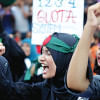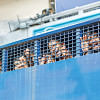July 31, 2024: Crackdown on march for justice

As the sun rose on July 31, 2024, thousands of students, teachers, and citizens across Bangladesh prepared to join the March for Justice, a countrywide programme organised by Students Against Discrimination.
Intended to honour those killed or arrested during the quota reform protests, the day soon became another chapter of repression and resistance, with clashes, detentions, and violence unfolding across cities.
The peaceful rallies were disrupted as law enforcers used teargas, stun grenades, and batons. At least 100 people were injured and 83 detained.
In Barishal, police charged at students on Kathpatti Road, injuring 11, including five journalists. A confrontation broke out inside Barishal City Corporation between protesters and City Panel Mayor-2 Enamul Haque Bahar. Thirteen protesters were detained; most were later released.
In Sylhet, around 100 Shahjalal University of Science and Technology students marched towards Subid Bazar. When they tried to cross police barricades around 1:00pm, teargas and stun grenades were fired. Locals said around 50 were injured. Another 100 cultural and political activists also marched through the city.
Khulna saw intense clashes as students marched from Nirala Mor to Royal Mor, dismantled barricades at Moyla Pota, and gathered at Satrasta. Police detained at least 19 people.
In Dinajpur, 10 were detained, including five female students, during rallies at Gore-Shaheed Boromath and the Shaheed Minar.
In Dhaka, private university students and teachers were intercepted near the High Court. At least five students were picked up; one was later released. Two Dhaka University professors -- Nusrat Jahan Chowdhury and Shehreen Amin Monami -- were shoved by police while trying to stop a student's arrest. The University Teachers' Network condemned the "misbehaviour" and demanded an investigation.
A group of pro-BNP DU teachers, joined by students from BUET, DU, and private universities, attempted to march to the High Court but were stopped near Shishu Academy. They held a sit-in at Doyel Chattar. Over 50 lawyers gathered near the closed Mazar Gate of the High Court, chanting in solidarity.
In Chattogram, students protested on court premises, joined by pro-BNP lawyers. A confrontation followed with pro-AL lawyers.
At Jahangirnagar University, students and teachers held a signature campaign demanding the release of detainees.
The then prime minister Sheikh Hasina said damaged buildings could be rebuilt but lives lost could not be returned. She claimed her government had fulfilled the student demands and that the Appellate Division had upheld the 2018 notification abolishing quotas.
At a protest organised by ULAB teachers, Prof Salimullah Khan called the killings state-sponsored and demanded an international probe. Wearing red, teachers expressed solidarity with the "killed, injured, disappeared, and persecuted" and called for the withdrawal of all cases.
Salimullah said the issue was political and criticised the government for choosing repression over dialogue. He said an apology and resignation were needed for a fresh start.
BNP Secretary General Mirza Fakhrul Islam Alamgir called the government a "public enemy" and accused it of genocide. He urged citizens to join the protests and called for international accountability.
That day, a Supreme Court lawyer filed a petition seeking a judicial commission to investigate the deaths of four children during the protests.
The government lifted restrictions on Facebook, TikTok, and WhatsApp after a meeting with Meta, ByteDance, and YouTube representatives.
Still, the crackdown continued.
Law enforcers arrested 281 more people in the 36 hours before 6:00pm on July 31 -- 205 in 31 districts, the rest in Dhaka. Of the 76 produced in court, most were jailed, some placed on remand.
This brought total arrests since July 18 to at least 10,769 across 673 cases filed in Dhaka and 51 districts.
Two US senators and two UK MPs urged Bangladeshi authorities to conduct an independent probe into the alleged rights violations.
That night, protest organisers announced Remembering the Heroes, a series of programmes to honour the fallen -- silent processions, protest songs, wall writings, and campaigns under hashtags like #JulyMassacre and #RememberingOurHeroes. They reiterated their nine-point demand, including the resignation of seven cabinet members and an apology from Hasina.
What began as remembrance became yet another day of trauma. But in the chants, marches, and graffiti, the students held their ground -- mourning, resisting and refusing to forget.

 For all latest news, follow The Daily Star's Google News channel.
For all latest news, follow The Daily Star's Google News channel. 








Comments